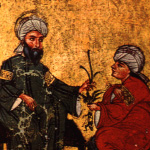
Early Islam

Selections from the Qur'an:
Sürah 2: The Cow
Sürah 4: The Women
Sürah 5: The Table
Sürah 10: Jonah
Sürah 19: Mary
. . .
Let's counter one of the precepts set up in the introductory comments and consider what makes ISLAM like JUDAISM and CHRISTIANITY. For Americans make much of the purported differences as we carelessly cast Muslim leaders as fanatics or terrorists and justify bombing their nations. These perceived differences reinforce and perpetuate stereotypes, whose influences are pervasive and dangerous, as Edward Said points out in his book Orientalism.
In the first place, Islam is an unflinchingly monotheistic faith. Even the readily-accepted notion that God could have a son (Christ) runs counter to this explicit monotheism. Like the Hebrew god, Allah is invisible, without material form; Allah is omnipotent, wrathful on occasion, yet eternally merciful. Like the God of the Genesis account, Allah has created the natural world and endowed humans with life among a world of divinely-created things. This human creature is regarded as free and individual; and the belief that individuality is good is shared among the Semitic faiths. The religions concur too on the presence and the nature of the soul, which lives on after the body has perished. The Koran describes both heaven and hell and forewarns that a Last Judgement will come when each person shall be judged for his or her deeds.
Muslims trace their lineage back through the Hebrew Scriptures to Ishmael, the son of Abraham and Hagar, Abraham's second wife. Later, as the story goes, Abraham's first wife Sarah conceived a son, whose name became Isaac. Isaac was the chosen one, while Ishmael and his mother were banished to the South and began their lives anew close to what is now the city of Mecca. Hundreds of years later, a child called Mohammed was born in the desert; he was a descendant of the Hebrew Ishmael. [Next]
Home | Near East | India | Egypt | China | Greece | Rome | Islam | Europe | Conclusions
Computer Services Provided by the University of Evansville.
Copyright © 1997. Exploring Ancient World Cultures.